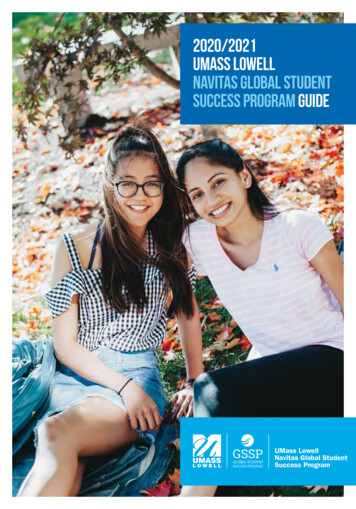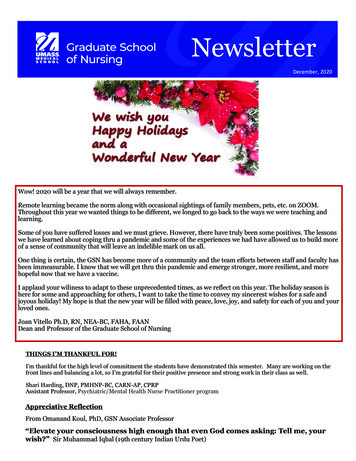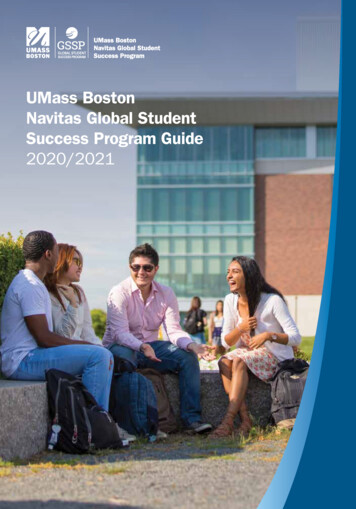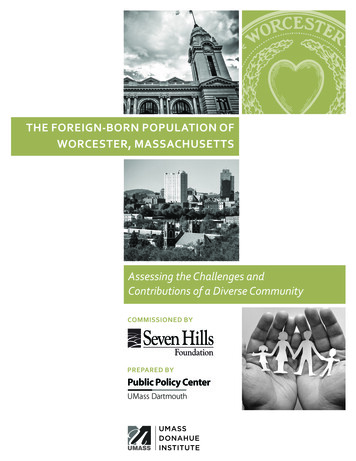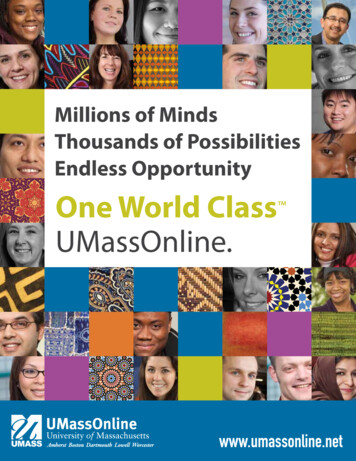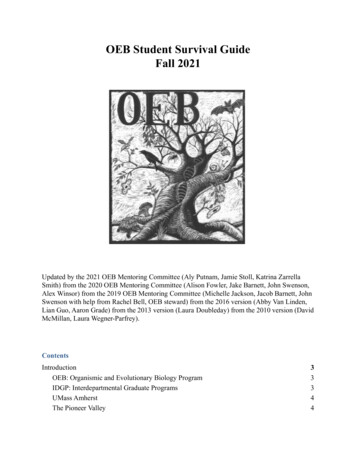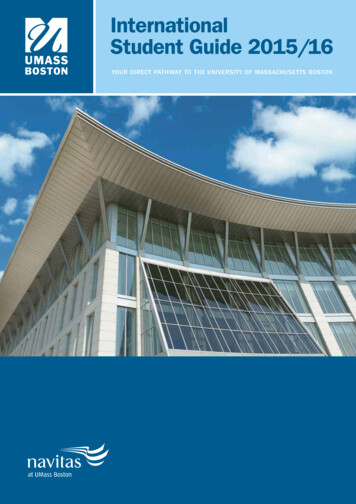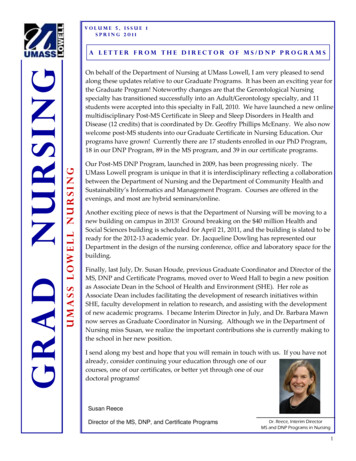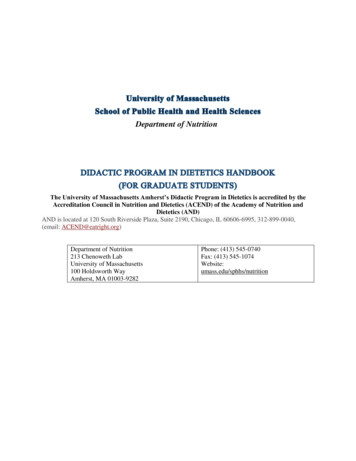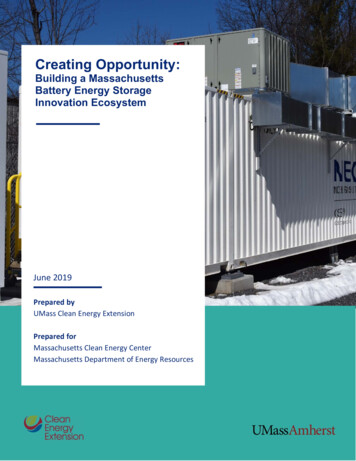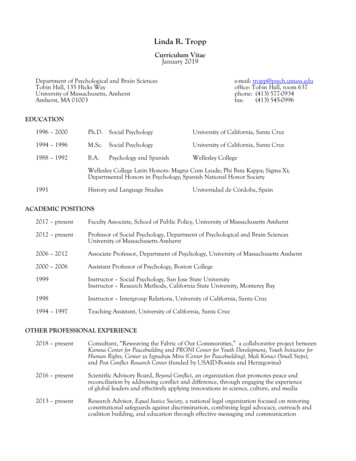
Transcription
Linda R. TroppCurriculum VitaeJanuary 2019Department of Psychological and Brain SciencesTobin Hall, 135 Hicks WayUniversity of Massachusetts, AmherstAmherst, MA 01003e-mail: tropp@psych.umass.eduoffice: Tobin Hall, room 637phone: (413) 577-0934fax:(413) 545-0996EDUCATION1996 – 2000Ph.D. Social PsychologyUniversity of California, Santa Cruz1994 – 1996M.Sc.Social PsychologyUniversity of California, Santa Cruz1988 – 1992B.A.Psychology and SpanishWellesley CollegeWellesley College Latin Honors: Magna Cum Laude; Phi Beta Kappa; Sigma Xi;Departmental Honors in Psychology; Spanish National Honor Society1991History and Language StudiesUniversidad de Córdoba, SpainACADEMIC POSITIONS2017 – presentFaculty Associate, School of Public Policy, University of Massachusetts Amherst2012 – presentProfessor of Social Psychology, Department of Psychological and Brain SciencesUniversity of Massachusetts Amherst2006 – 2012Associate Professor, Department of Psychology, University of Massachusetts Amherst2000 – 2006Assistant Professor of Psychology, Boston College1999Instructor – Social Psychology, San Jose State UniversityInstructor – Research Methods, California State University, Monterey Bay1998Instructor – Intergroup Relations, University of California, Santa Cruz1994 – 1997Teaching Assistant, University of California, Santa CruzOTHER PROFESSIONAL EXPERIENCE2018 – presentConsultant, “Reweaving the Fabric of Our Communities,” a collaborative project betweenKaruna Center for Peacebuilding and PRONI Center for Youth Development, Youth Initiative forHuman Rights, Centar za Izgradnju Mira (Center for Peacebuilding), Mali Koraci (Small Steps),and Post Conflict Research Center (funded by USAID-Bosnia and Herzegovina)2016 – presentScientific Advisory Board, Beyond Conflict, an organization that promotes peace andreconciliation by addressing conflict and difference, through engaging the experienceof global leaders and effectively applying innovations in science, culture, and media2013 – presentResearch Advisor, Equal Justice Society, a national legal organization focused on restoringconstitutional safeguards against discrimination, combining legal advocacy, outreach andcoalition building, and education through effective messaging and communication
2011 – presentResearch Advisor, National Coalition on School Diversity, an organization that advocates forenhanced commitment to racial and economic integration in U.S. public schools2009 – presentResearch Advisor, Perception Institute, an organization that combats racial bias and tests newmethods of exposing bias and intervening to reduce bias in the public sphere2016 – 2018Consultant, “Healing Our Communities: Promoting Social Cohesion in Rwanda,” acollaborative project between Karuna Center for Peacebuilding and Institute of Researchand Dialogue for Peace, Healing and Rebuilding Our Communities, and Aegis Trust(funded by USAID-Rwanda)2017Invited Instructor, Workshop on “Immigrant-Native Relations in Multi-Ethnic Societies,”sponsored by the Departments of Social and Cultural Psychology, Political Science, andSociology, University of Leuven, Belgium.2015 – 2016Research Working Group, National Initiative for Building Community Trust and Justice,designed to improve relationships and increase trust between communities, law enforcement,and the criminal justice system (funded by the U.S. Department of Justice)2015Invited Instructor, Intergroup Relations and Disparities, Summer Institute in Social and PersonalityPsychology, sponsored by the Society of Personality and Social Psychology, Boston2006 – 2015Director, Psychology of Peace and Violence Program, University of Massachusetts Amherst2010 – 2014Invited Member, Cultural Contact and Immigration Working Group, Russell Sage Foundation2009 – 2014Research Advisor, Center for Policing Equity, a research- and policy-based organization thataids police departments to realize their own equity goals and advance the issues of equity withinpolicing and other organizations2008 – 2012Quantitative Evaluation Working Group, Una Global (www.unaglobal.org), aninternational, interdisciplinary network of researchers, policymakers, and practitionersworking to reduce racial and ethnic divisions through early childhood programs2008Invited Instructor, Workshop on “Intergroup Contact among Different Status Groups,”sponsored by the Kurt Lewin Institute and the Universities of Groningen, Amsterdam,Leiden, Utrecht, and Free University of Amsterdam, Netherlands2007Invited Instructor, Workshop on “Prejudice Reduction and Intervention,” SummerSchool of the International Graduate College on Conflict and Cooperation betweenSocial Groups, sponsored by the Universities of Jena (Germany), Kent and Sussex(United Kingdom) and Louvain-la-Neuve (Belgium). Scherwin, Germany2005 – 2007Invited Participant, Working Group on “Promoting Civil Rights and Protecting Studentsfrom Harassment, Bullying, and Hate Crimes,” Safe Schools Initiative, Commonwealth ofMassachusetts Attorney General’s Office2006Expert Reviewer and Contributor, Amicus Curiae briefs prepared for the U.S. SupremeCourt by the American Psychological Association, American Educational Research Association,and Civil Rights Project in Meredith v. Jefferson County Board of Education and ParentsInvolved in Community Schools v. Seattle School District (concerning voluntary racialdesegregation plans in public schools)2004Expert Reviewer and Presenter at Massachusetts Public Forum, Amicus Curiae Briefsubmitted by the American Psychological Association to the U.S. District Court of Appeals,in Comfort v. Lynn School Committee (concerning voluntary desegregation plans in schools)1993 – 1994Project Manager, Normative Development of Puerto Rican Adolescents StudyCenter for Research on Women, Wellesley College1993 – 1994Home Interviewer, Boston After-School Experiences StudyCenter for Research on Women, Wellesley College
1992 – 1993Data Analyst, Media Bias in Election Coverage ProjectKennedy School of Government, Harvard University1992 – 1993Project Coordinator, Sexual Harassment in Schools ProjectCenter for Research on Women, Wellesley CollegeHONORS AND AWARDSFellow of the Society of Experimental Social Psychology, Society for Personality and Social Psychology,Society for the Psychological Study of Social Issues, and the American Psychological Association2019 – 2020Chancellor’s Leadership Fellow, Office of the ChancellorUniversity of Massachusetts Amherst2018 – 2019Nomination for Distinguished Teaching Award (student recognition of teaching on campus)University of Massachusetts Amherst2018Scientific Impact Award, honoring a specific article offering a theoretical, empirical, and/ormethodological contribution that has proven highly influential over the last 25 yearsSociety of Experimental Social Psychology2017Distinguished Service AwardSociety for the Psychological Study of Social Issues2015Lynn Stuart Weiss Award, with honorary lecture at annual meeting of the American PsychologicalAssociation, to promote psychology as a means of attaining peace through world lawAmerican Psychological Foundation2013Outstanding Teaching and Mentoring AwardSociety for the Psychological Study of Social Issues2012Distinguished Academic Outreach Award for ResearchUniversity of Massachusetts Amherst2008Erik Erikson Award for Distinguished Early Career AchievementInternational Society of Political Psychology2003Gordon W. Allport Intergroup Relations Prize, for A Meta-Analytic Test andReformulation of Intergroup Contact Theory (co-authored with Thomas F. Pettigrew)Society for the Psychological Study of Social Issues2000McKeachie Early Career Teaching Excellence AwardSociety for the Teaching of Psychology (American Psychological Association Division 2)1999Outstanding Teaching Assistant Award from the Graduate CouncilDivision of Graduate Studies, University of California, Santa Cruz1996 – 1998Outstanding Teaching Assistant AwardDepartment of Psychology, University of California, Santa CruzFELLOWSHIPS AND GRANTS2018 – presentProject Award, “Promoting Academic Success and Belonging for All Students: Multi-ModalSchool District Proposal” (Principal Investigator, Boston Schools Site; Co-Investigator,Michigan Schools Site; with Rachel Godsil and Kent Harber). Raikes Foundation2017 – 2018Visiting Scholars Program, Russell Sage Foundation
2015 – 2018Supplemental Awards, “Immigrant-Native Relations in 21st-Century America: IntergroupContact, Trust, and Civic Engagement”, Russell Sage Foundation(Joint Principal Investigator with Michael Jones-Correa, Helen Marrow, and Dina Okamoto)2014 – 2017Project Award, “Immigrant-Native Relations in 21st-Century America: Intergroup Contact,Trust, and Civic Engagement”, Carnegie Corporation(Joint Principal Investigator with Michael Jones-Correa, Helen Marrow, and Dina Okamoto)2016Distinguished Visiting Fellow, Advanced Research CollaborativeThe Graduate Center, City University of New York2012 – 2016Project Award, “Immigrant-Native Relations in 21st-Century America: Intergroup Contact,Trust, and Civic Engagement”, Russell Sage Foundation(Joint Principal Investigator with Michael Jones-Correa, Helen Marrow, and Dina Okamoto)2012 – 2015“Building successful diverse communities: What works and why?” Australian Research CouncilLinkage Grant (Partner Investigator with Katherine Reynolds, Principal Investigator)2012 – 2014“Speaker Series on International Conflict Resolution and Peacebuilding”Public Education for Peacebuilding Support, United States Institute of Peace2012 – 2013“Status, Racialization, and Intergroup Contact among Native and Immigrant Groups”,University of California Center for New Racial Studies(Co-Investigator with Dina Okamoto, Michael Jones-Correa and Helen Marrow)2011 – 2012“Social Status and Qualities of Intergroup Relations among Native and Immigrant Groups”,Presidential Authority Award, Russell Sage Foundation(Joint Principal Investigator with Michael Jones-Correa, Helen Marrow, and Dina Okamoto)2011William Evans Fellowship, National Centre for Peace and Conflict Studies,University of Otago, New Zealand2010“Bridging Social and Peace Perspectives on Conflict”, Research Leadership in Action Grant,Office of Vice-Chancellor for Research and Engagement, University of Massachusetts Amherst2009 – 2010Family Research Scholar, Center for Research on Families, University of Massachusetts Amherst2009Henri Tajfel Fellowship, International Graduate College on Conflict and Cooperation betweenSocial Groups, Friedrich Schiller University, Germany.2009Healey Endowment Faculty Research Grant,Office of Research Affairs, University of Massachusetts Amherst2007Visiting Scholar, Center for Conflict Studies, Philipps-Universität Marburg, Germany2007International Conference Grant, Joint Program of the Society for the Psychological Studyof Social Issues and the European Association of Social Psychology (SPSSI-EASP)(with Oliver Christ, Miles Hewstone, and Ulrich Wagner)2005Research Incentive Grant,Division of Graduate Studies and Research, Boston College2003 – 2005Behavioral Science Track Award for Rapid Transition (B/START)National Institute of Mental Health, National Institutes of Health2004Visiting Scholar, Institute of Personality and Social Research, University of California, Berkeley2004Faculty Fellowship, College of Arts and Sciences, Boston College2002 – 2003Research Expense GrantDivision of Graduate Studies and Research, Boston College
2000Nomination for Individual National Research Service Award (declined to accept faculty position)National Institute of Mental Health, National Institutes of Health1998 – 1999American Fellowship for Dissertation ResearchAmerican Association of University Women Educational Foundation1998Grant-in-Aid, Society for the Psychological Study of Social Issues1997Phi Beta Kappa Fellowship for Graduate StudyPhi Beta Kappa Association of Northern California1995 – 1996Fellow of the Office of Bilingual Education and Minority Language AffairsU.S. Department of Education1995Edna V. Moffett FellowshipWellesley College Committee for Graduate Study1986 – 1987Fellowship for Foreign Study (Ecuador)Rotary International Youth Exchange ProgramBOOKS AND EDITED VOLUMESTropp, L. R. (Ed.) (2018). Making research matter: A psychologist’s guide to public engagement. Washington D.C.:APA Books.Wright, S. C., Tropp, L. R., & Mazziotta, A. (Eds.) (2017). Special issue, Contact between groups, peace,and conflict. Peace and Conflict: Journal of Peace Psychology.Tropp, L. R. (Ed.) (2012). Oxford handbook of intergroup conflict. Oxford: Oxford University Press.Christ, O., Hewstone, M., Tropp, L. R., & Wagner, U. (Eds.) (2012). Special Section, Dynamic processes inintergroup contact. British Journal of Social Psychology, 51 (2).Pettigrew, T. F., & Tropp, L. R. (2011). When groups meet: The dynamics of intergroup contact.New York: Psychology Press.Tropp, L. R., & Mallett, R. (Eds.) (2011). Moving beyond prejudice reduction: Pathways to positive intergrouprelations. Washington DC: American Psychological Association.Wagner, U., Tropp, L. R., Finchilescu, G., & Tredoux, C. (Eds.) (2008). Improving intergroup relations: Building onthe Legacy of Thomas F. Pettigrew. Malden, MA: Wiley-Blackwell.Nagda, B., Tropp, L. R., & Paluck, E. (Eds.) (2006). Special Issue, Reducing prejudice and promoting social inclusion:Integrating research, theory, and practice on intergroup relations. Journal of Social Issues, 62(3).PUBLICATIONSGrutter, J., & Tropp, L. R. (in press). How friendship is defined matters for predicting intergroup attitudes: Sharedactivities and mutual trust with cross-ethnic peers during late childhood and early adolescence. InternationalJournal of Behavioral Development.Tropp, L. R., & Molina, L. (in press). Intergroup processes: From prejudice to positive relations between groups. InK. Deaux & M. Snyder (Eds.), Oxford handbook of personality and social psychology, 2nd edition. New York:Oxford University Press.Kotzur, P. F., Tropp, L. R., & Wagner, U. (2018). Welcoming the unwelcome: How contact shapes contexts ofreception for new immigrants in Germany and the United States. Journal of Social Issues, 74, 812-832.Tropp, L. R., & Barlow, F. K. (2018). Making advantaged racial groups care about racial inequality:Intergroup contact as a route to psychological investment. Current Directions in Psychological Science, 27, 194-199
Jones-Correa, M., Marrow, H., Okamoto, D., & Tropp, L. R. (2018). Immigrant perceptions of U.S.-bornreceptivity and the shaping of American identity. Russell Sage Foundation Journal of the Social Sciences, 4, 47-80.Tropp, L. R., Okamoto, D. G., Marrow, H. B., & Jones-Correa, M. (2018). How contact experiences shapewelcoming: Perspectives from U.S.-born and immigrant groups. Social Psychology Quarterly, 81, 23-47.Knowles, E. & Tropp, L. R. (2018). The racial and economic context of Trump support: Evidence for threat, identity,and contact effects in the 2016 Presidential Election. Social Psychological and Personality Science, 9, 275-284.Gómez, A., Tropp, L. R., Vazquez, A., Voci, A., & Hewstone, M. (2018). Depersonalized extended contact andinjunctive norms about cross-group friendship impact intergroup orientations. Journal of Experimental SocialPsychology, 76, 356-370.Hayward, L. E., Tropp, L. R., Hornsey, M. J., & Barlow, F. K. (2018). Negative (but not positive) contact with Whitesdirectly predicts collective action among racial and ethnic minorities. British Journal of Social Psychology, 57, 1-20.Orosz, G., Bruneau, E., Tropp, L. R., Sebestyen, N., Toth-Kiraly, I., & Bothe, B. (2018). What predictsanti-Roma prejudice? Qualitative and quantitative analysis of everyday sentiments about the Roma.Journal of Applied Social Psychology, 48, 317-328.Hassler, T., Gonzalez, R., Lay, S., Lickel, B., Zagefka, H., Brown, R., Tropp, L. R., Manzi, J., & Bernardino, M.(2018). With a little help from our friends: The impact of cross-group friendship on acculturationpreferences. European Journal of Social Psychology. Published online at: https://doi.org /10.1002/ejsp.2383Hayward, L. E., Hornsey, M. J., Tropp, L. R., & Barlow, F. K. (2017). Positive and negative intergroupcontact predict White and Black Americans’ judgments about police violence against Black Americans.Journal of Applied Social Psychology, 47, 605-615.Tropp, L. R., & Al Ramiah, A. (2017). Contact strategies for improving intergroup relations among youth.In A. Rutland, D. Nesdale, & C. S. Brown (Eds.), Wiley-Blackwell Handbook of Group Processes in Children andAdolescents (pp. 353-372). Hoboken, NJ: Wiley and Sons.Selvanathan, H., Techakesari, P., Tropp, L. R., & Barlow, F. K. (2017). Whites for racial justice: How contact withBlacks predicts Whites’ collective action. Group Processes and Intergroup Relations. Published online en, T. C., Leidner, B., & Tropp, L. R. (2017). Are they for us or against us? How intergroup metaperceptionsshape foreign policy attitudes. Group Processes and Intergroup Relations. Published online en, T. C., & Tropp, L. R. (2017). Intergroup contact theory. In F. Moghaddam (Ed.),Sage Encyclopedia of Political Behavior. Thousand Oaks, CA: Sage.Hayward, L., Tropp, L. R., Hornsey, M., & Barlow, F. (2017). Toward a comprehensive understanding of intergroupcontact: Descriptions and mediators of positive and negative contact among majority and minority groups.Personality and Social Psychology Bulletin, 43, 347-364.Tropp, L. R., Hawi, D., O’Brien, T. C., Gheorghiu, M., Zetes, A., & Butz, D. (2017). Intergroup contactand the potential for post-conflict reconciliation: Studies in South Africa and Northern Ireland. Peace andConflict: Journal of Peace Psychology, 23, 239-249.Kende, A., Tropp, L. R., & Lantos, N. (2017). Testing a contact intervention based on intergroup friendship betweenRoma and non‐Roma Hungarians: Reducing bias through institutional support in a non‐supportive societalcontext. Journal of Applied Social Psychology, 47, 47-55.Wright, S. C., Tropp, L. R., & Mazziotta, A. (2017). Contact between groups, peace, and conflict.Peace and Conflict: Journal of Peace Psychology, 23, 207-209.Wright, S. C., Mazzziotta, A., & Tropp, L. R. (2017). Contact and intergroup conflict: New ideas for the road ahead.Peace and Conflict: Journal of Peace Psychology, 23, 317-327.
Gonzalez, R., Lickel, B., Gupta, M., Tropp, L. R., Luengo, B. P., Mora, E., de Tezanos Pinto, P., Berger, C., Valdenegro,D., Cayul, O., Miranda, D., Saavedra, P., & Bernardino, M. (2017). Ethnic identity development andacculturation preferences among minority and majority youth: Norms and contact. Child Development, 88,743-760.Tropp, L. R., Mazziotta, A., & Wright, S. C. (2017). Recent developments in intergroup contact research:Affective processes, group status, and contact valence. In C. Sibley and F. K. Barlow (Eds.), CambridgeHandbook of the Psychology of Prejudice (pp. 463-480). Cambridge: Cambridge University Press.Tropp, L. R., O’Brien, T. C., Gonzalez, R., Valdenegro, D., Migacheva, K., de Tezanos Pinto, P., Berger, C., & Cayul, O.(2016). Predicting interethnic experiences among ethnic minority and majority youth: The roles ofperceived peer norms, school norms, and discrimination. Child Development, 87, 1436-1451.Orosz, G., Banki, E., Bothel, B., Toth-Kiraly, & Tropp, L. R. (2016). Don't judge a living book by its cover:Effectiveness of the Living Library intervention in reducing prejudice toward Roma and LGBT people.Journal of Applied Social Psychology, 46, 510-517.Vollhardt, J. R., Nair, R., & Tropp, L. R. (2016). Predicting support for refugees and immigrants among minoritygroups: The role of inclusive victim consciousness. Journal of Applied Social Psychology, 46, 354-368.Molina, L. E., Tropp, L. R., & Goode, C. (2016). Reflections on intergroup relations. Current Opinion inPsychology, 11, 120-124.Tropp, L. R. (2015). Dismantling the ethos of conflict: Strategies for improving intergroup relations. In E. Halperin &K. Sharvit (Eds.), The social psychology of intractable conflicts (pp. 159-171). New York: Springer.O’Brien, T. C., & Tropp, L. R. (2015). Psychology: The phenomenology of human security: In P. Bourbeau (Ed.),Security: Dialogue across disciplines (pp. 137-155) Cambridge: Cambridge University Press.Leidner, B, Tropp, L, & Lickel, B. (2015). Political psychology of groups. To appear in O. Feldman & S. Zmerli (Eds.),Politische Psychologie: Handbuch für Studium und Wissenschaft (Political Psychology: Handbook for Study and Science,pp. 236-252). Baden-Baden, Germany: Nomos Verlagsgesellschaft.Tropp, L. R. (2015). Intergroup contact. In J. Bennett (Ed.), Sage Encyclopedia of Intercultural Competence (pp. 536-539).Thousand Oaks, CA: Sage.Tropp, L. R., & Page-Gould, E. (2014). Contact between groups. In M. Mikulincer, P. R. Shaver, J. F. Dovidio & J. A.Simpson (Eds.), APA handbook of personality and social psychology, Volume 2: Group Processes (pp. 535-560).Washington DC: American Psychological Association.Tropp, L. R., O’Brien, T., & Migacheva, K. (2014). How peer norms of inclusion and exclusion predictchildren’s interest in cross-ethnic friendships. Journal of Social Issues, 70, 151-166.Adams, M., Perry-Jenkins, M., & Tropp, L. R. (2014). Pedagogical tools for social justice and psychology. In C.Johnson, H. Friedman, J. Diaz, Z. Franco, & B. Nastasi (Eds.), Praeger handbook on social justice and psychology(pp. 227-247). Santa Barbara, CA: Praeger.Migacheva, K., & Tropp, L. R. (2013). Learning orientation as a predictor of positive intergroup contact.Group Processes and Intergroup Relations, 16, 426-444.Leidner, B., Tropp, L. R., & Lickel, B. (2013). Bringing science to bear – on peace, not war: Elaboratingon psychology’s potential to promote peace. American Psychologist, 68, 514-526.Tropp, L. R., Hawi, D., Van Laar, C., & Levin, S. (2012). Cross-ethnic friendships, perceived discrimination,and their effects on ethnic activism over time: A longitudinal investigation of three ethnic minority groups.British Journal of Social Psychology, 51, 257-272.Aboud, F., Tredoux, C., Tropp, L. R., Brown, C., Niens, U., & Noor, N. (2012). Interventions to reduceprejudice and enhance inclusion and respect for ethnic differences in early childhood: A systematic review.Developmental Review, 32, 307-336.
Saguy, T., Tropp, L. R., & Hawi, D. (2012). The role of group power in intergroup contact. In G. Hodson &M. Hewstone (Eds.), Advances in intergroup contact (pp. 113-131). New York: Psychology Press.Christ, O., Hewstone, M., Tropp, L. R., & Wagner, U. (2012). Dynamic processes in intergroup contact. BritishJournal of Social Psychology, 51, 219-220.Tropp, L. R. (2012). Understanding and responding to intergroup conflict: Toward an integrated analysis. In L. R.Tropp (Ed.), Oxford handbook of intergroup conflict (pp. 3-10). New York: Oxford University Press.Cronin, T. J., Levin, S., Branscombe, N., Van Laar, C., & Tropp, L. R. (2012). Ethnic identification in responseto perceived discrimination protects well-being and promotes activism: A longitudinal study of Latino collegestudents. Group Processes and Intergroup Relations, 15, 393-407.Tropp, L. R., & Molina, L. (2012). Intergroup processes: From prejudice to positive relations between groups. InK. Deaux & M. Snyder (Eds.), Oxford handbook of personality and social psychology (pp. 545-570). New York:Oxford University Press.Bilali, R., Tropp, L. R., & Dasgupta, N. (2012). Attributions of responsibility and perceived harm in theaftermath of mass violence. Peace and Conflict: Journal of Peace Psychology, 18, 21-38.Tropp, L. R. (2012). Intergroup contact theory. In D. Christie (Ed.), Encyclopedia of peace psychology (pp. 254-259).Hoboken, NJ: Wiley-Blackwell.Gómez, A., Tropp, L. R., & Fernandez, S. (2011). When extended contact opens the door to future contact:Testing the effects of extended contact on intergroup attitudes and expectancies among minority andmajority groups. Group Processes and Intergroup Relations, 14, 161-173.Davies, K., Tropp, L. R., Aron, A., Pettigrew, T. F., & Wright, S. C. (2011). Cross-group friendships andintergroup attitudes: A meta-analytic review. Personality and Social Psychology Review, 15, 332-351.Adesokan, A., van Dick, R., Ullrich, J., & Tropp, L. R. (2011). Diversity beliefs as moderator of the contact-prejudicerelationship. Social Psychology, 271-278.Pettigrew, T. F., Tropp, L. R., Wagner, U., & Christ, O. (2011). Recent advances in intergroup contact theory.International Journal of Intercultural Relations, 35, 271-280.Tropp, L. R., & Mallett, R. K. (2011). Charting new pathways to positive intergroup relations. In L. R.Tropp & R. K. Mallett (Eds.), Moving beyond prejudice reduction: Pathways to positive intergroup relations(pp. 3-17). Washington DC: American Psychological Association.Migacheva, K., Tropp, L. R., & Crocker, J. (2011). Focusing beyond the self: Goal orientations in intergrouprelations. In L. R. Tropp & R. Mallett (Eds.), Moving beyond prejudice reduction: Pathways to positiveintergroup relations (pp. 99-115). Washington DC: American Psychological Association.Dixon, J., Tropp, L. R., Durrheim, K., & Tredoux, C. (2010). ‘Let them eat harmony’: Prejudice reduction strategiesand attitudes of historically disadvantaged groups. Current Directions in Psychological Science, 19, 76-80.Dixon, J., Tredoux, C., Durrheim, K., Tropp, L. R., Eaton, L., & Clack, B. (2010). Challenging the stubborncore of opposition to equality: Racial contact and policy attitudes. Political Psychology, 31, 831-855.Dixon, J., Durrheim, K., Tredoux, C., Tropp, L. R., Clack, B., & Eaton, L. (2010). A paradox of integration?Interracial contact, prejudice reduction, and blacks’ perceptions of racial discrimination. Journal of Social Issues,66, 401-416.Tropp, L. R., & Pettigrew, T. F. (2009). Intergroup contact theory: Summarizing results from a meta-analytic review.In G. L. Carter (Ed.), Empirical approaches to sociology, 5th edition. Boston: Allyn & Bacon.Tropp, L. R., & Kim, J. (2009). Ethnicity. In J. Levine & M. Hogg (Eds.), Sage Encyclopedia of Group Processes andIntergroup Relations.Vollhardt, J., Migacheva, K., & Tropp, L. R. (2009). Social cohesion and tolerance for group differences. In J. De Rivera(Ed.), Handbook on building cultures of peace (pp. 139-152). New York: Springer.
Tropp, L. R. (2008). The role of trust in intergroup contact: Its significance and implications for improving relationsbetween groups. In U. Wagner, L. R. Tropp, G. Finchilescu, & C. Tredoux (Eds.), Improving intergroup relations:Building on the legacy of Thomas F. Pettigrew (pp. 91-106). Malden, MA: Blackwell.Page-Gould, E., Mendoza-Denton, R., & Tropp, L. R. (2008). With a little help from my cross-group friend:Reducing anxiety in intergroup contexts through cross-group friendship. Journal of Personality andSocial Psychology, 95, 1080-1094.Pettigrew, T. F., & Tropp, L. R. (2008). How does intergroup contact reduce prejudice? Meta-analytic tests of threemediators. European Journal of Social Psychology, 38, 922-934.Tropp, L. R. & Prenovost, M. (2008). The role of intergroup contact in predicting interethnic attitudes: Evidencefrom meta-analytic and field studies. In S. Levy and M. Killen (Eds.), Intergroup attitudes and relations in childhoodthrough adulthood (pp. 236-248). Oxford: Oxford University Press.Tropp, L. R., Smith, A. E., & Crosby, F. J. (2007). The use of research in the Seattle and Jefferson Countydesegregation cases: Connecting social science and the law. Analyses of Social Issues and Public Policy,7, 93-120.Tropp, L. R. (2007). Perceived discrimination and interracial contact: Predicting interracial closenessamong Black and White Americans. Social Psychology Quarterly, 70, 70-81.Tropp, L. R. (2007). Intergroup relations. In R. Baumeister and K. Vohs (Eds.), Encyclopedia of Social Psychology(pp. 494-495). Thousand Oaks, CA: Sage.Tropp, L. R., & Bianchi, R. A. (2007). Interpreting references to group membership in context: Feelingsabout intergroup contact depending on who says what to whom. European Journal of Social Psychology,37, 153-170.Méndez, E., Gómez, A., & Tropp, L. R. (2007). When metaperceptions are affected by intergroup processes.International Journal of Psychology and Psychological Therapy, 7, 237-250.Pittinsky, T. L., Montoya, R. M., Tropp, L. R., & Chen, A. (2007). How and when leader behavior affectsintergroup liking: Affect, approval, and allophilia. In C. Anderson, B. Mannix, & M. Neale (Eds.),Affect and Groups: Research on Managing Groups and Teams, Vol. 10 (pp. 125-144). San Diego: Elsevier.Tropp, L. R., & Bianchi, R. A. (2006). Valuing diversity and intergroup contact. Journal of Social Issues, 62, 533-551.Frey, F. E., & Tropp, L. R. (2006). Being seen as individuals versus as group members: Extending researchon metaperception to intergroup contexts. Personality and Social Psychology Review, 10, 265-280.Pettigrew, T. F., & Tropp, L. R. (2006). A meta-analytic test of intergroup contact theory. Journal of Personalityand Social Psychology, 90, 751-783. (note: authors are listed alphabetically and contributed equally)Nagda, B. A., Tropp, L. R., & Paluck, E. L. (2006). Looking back as we look forward: Integrating research,theory, and practice on intergroup relations. Journal of Social Issues, 62, 439-451.Tropp, L. R., Stout, A. M., Boatswain, C., Wright, S. C., & Pettigrew, T. F. (2006). Trust and acceptance inresponse to references to group membership: Minority and majority perspectives on cross-groupinteractions. Journal of Applied Social Psychology, 36, 769-794.Tropp, L. R. (2006). Stigma and intergroup contact among members of minority and majority status groups.In S. Levin & C. Van Laar (Eds.), Stigma and group inequality: Social psychological perspectives (pp. 171-191).Mahwah, NJ: Erlbaum.Tropp, L. R., & Pettigrew, T. F. (2005). Relationships between intergroup contact and prejudice among minorityand ma
2011 - present Research Advisor, National Coalition on School Diversity, an organization that advocates for enhanced commitment to racial and economic integration in U.S. public schools 2009 - present Research Advisor, Perception Institute, an organization that combats racial bias and tests new methods of exposing bias and intervening to reduce bias in the public sphere
